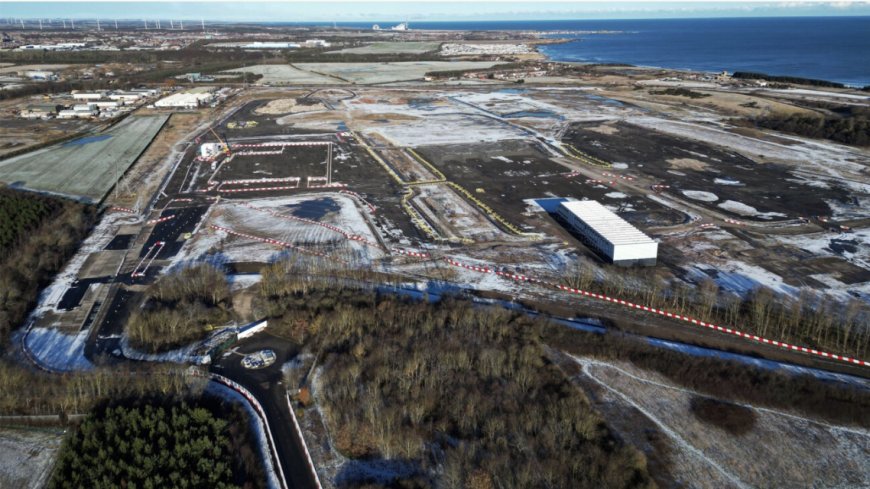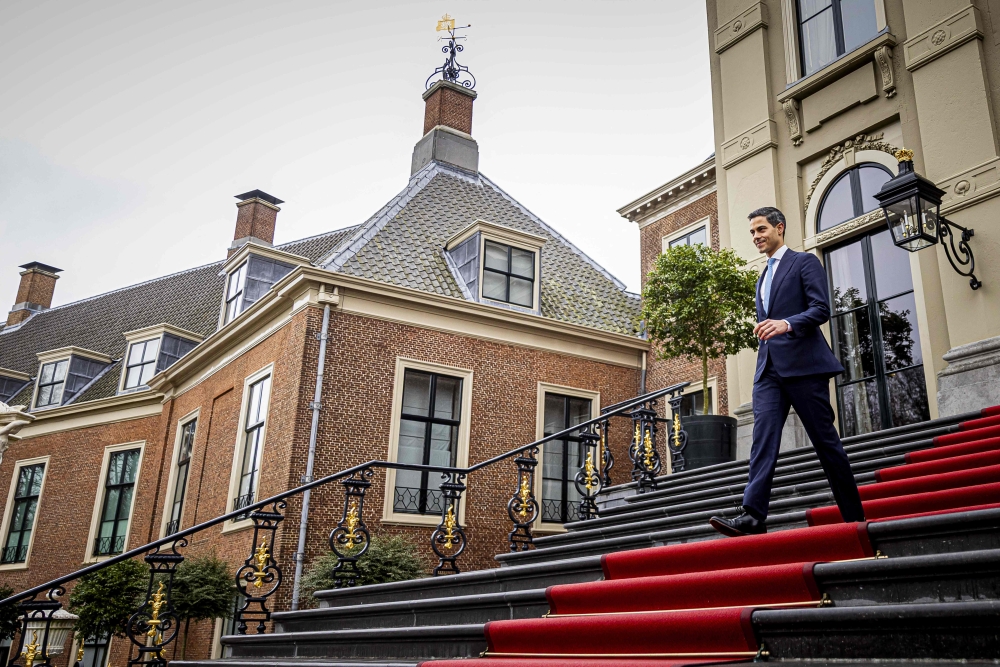Ten-Foot Chopsticks
The ghost of the industrial revolution haunts Britain. The language of today’s politicians, of unlocking and unleashing the industrial heartlands, is the language of a seance promising communication with an era that is just beyond the curtain, and can be summoned back if the right steps are taken.

arly last year, Jeremy Corbyn and his wife went to Newcastle and took the bus the short distance up the coast to Blyth in Northumberland, to see their old friend, the former Labour MP and miners’ leader Ronnie Campbell, who was gravely ill. It was a private visit by one left-wing insubordinate to another, by a campaigner who tried to re-radicalise Labour to one of his most loyal supporters. I only found out about it when I was sitting in the front room of the Campbells’ house with his widow, Deirdre, and we started talking about the new party Corbyn is trying to set up. Deirdre dived into the crowded shelves of family photographs in a niche by the fireplace and fished out a picture of the two men on the sofa: Ronnie looking somehow very ill and pleased at the same time; Corbyn dandling a Campbell great-grandson on his knee and looking relaxed, almost jovial. Ronnie died two weeks later. Deirdre reproached herself for not having framed the picture sooner; it was crumpled where her great-grandson kept picking it up to look at it.
I’d come to the Campbells’ house straight from the new station on the edge of town. The first few streets I cycled through were lined with Union Jacks somebody had lashed halfway up the lamp-posts. As I approached the centre they petered out. Deirdre didn’t like the mysteriously appearing flags. She read them as a petty, Little Englander warning to immigrants in a place, once Labour through and through, that has fallen hard for Nigel Farage. Blyth was for generations a skilled labourers’ town, a place of shipbuilding, coal shipping and coal mining. But these old industries have vanished as completely as if they were never there, and most of the people who worked in them are dead.
Ronnie Campbell, who went down the pit at fifteen, who led the National Union of Mineworkers at Blyth’s only surviving colliery in the 1984-85 strike, who was so committed to the miners’ struggle against Margaret Thatcher that he led a band of pickets out to sea in a small boat to try to stop an oil tanker, became Blyth Valley’s MP in 1987. He won the seat seven times after that, hewing to his communitarian principles, his belief in socialism and a hostility to the EU that began long before Brexit had a name. In 2019, when he stood down, his would-be successor was beaten by a Conservative in Boris Johnson’s get-Brexit-done landslide. A picture from the night shows Johnson pounding the air with his fists and gurning in triumph at the Blyth result, the first time Labour had lost the seat since it was established in 1950. Labour won it back last year, with the town of Blyth moved into another constituency, Blyth and Ashington, but since then, according to Deirdre (who’s still a Labour activist) and local election results, it has swung decisively to Reform. Before this year, Blyth’s eight seats on Northumberland County Council were split four for Labour, three Tory, one Lib Dem. After the local elections in May, it was seven Reform, one Conservative (overall, the Tories have the most seats and run a minority administration). Deirdre Campbell was one of those who lost to Reform, beaten by Barry Elliott, a ‘striking individual’, as Vladimir Putin called Donald Trump. She still sits on the town council, a body with few powers; it has also fallen to Reform. She told me how horrified she’d been during the last campaign at the hostility provoked by the mere mention of Keir Starmer’s name, or the sight of a Labour rosette.
‘It was shocking in a few months how things have changed. Oh my God, I’ve never had so much abuse. It was absolutely horrendous,’ she said. ‘As soon as they open the door. And I would always wear my rosette, and they would just look at you. They’d either slam the door or tell you go forth. I knew we were doomed, the mention of Starmer
Following the shift in constituency boundaries, Labour shut its party office in town. Deirdre thinks that the local Labour MP, Ian Lavery, is too wary of encountering hostile locals. She feels isolated. ‘Every Sunday night, when we go to town and have a game of bingo in the club, and people are always having a go, you know, here’s the Labour Party coming. You know, this malarkey, “What are you going to do now? Are you getting your refund?” And I just laugh, and I say: “Look, if you want to talk about it, I’ll talk about it, but you know, you’re not insulting me, because it doesn’t wash with me. I don’t care
I asked her whether she had an interest in Corbyn’s new party. ‘Well, I might,’ she said. ‘I’ll wait and see what Starmer’s going to do. And I might not – come next year, I might not be renewing my membership, and I’ve been a member of the Labour Party since 1969. It’s not something I would think of doing lightly.’ What could Starmer do to win her back? ‘They need to start looking after the needy, the poor,’ she said. But she acknowledged this wouldn’t cut it in Blyth. The town, or at least a significant number of people who live there, has become obsessed with immigration – immigration as a source of disorder, discomfort and disruption; an abstract, visceral sense that outsiders make unfair claims on places, benefits and opportunities to which they have no birthright, and which should, therefore, be denied them; a belief that the removal of strangers whose appearance and manner mark them out as different would cause no new problems and make the natives happier.
‘I think it’s the boats, this thing of the boats, it’s critical,’ Deirdre told me. ‘People are tired of nobody doing anything about all these people coming in in boats and the Tories were going to do it. They didn’t have an answer. Labour promised to do something, they haven’t got an answer. Farage tells you he has an answer. He hasn’t got an answer, but he tells you he has. And he speaks the language of those who don’t want people coming into the country.’
I hadn’t come to Blyth to write about Reform. I’d come to satisfy my curiosity about a fantastical factory that at one time was set to be built nearby, a huge new manufacturing plant that was going to make batteries for electric cars and bring thousands of jobs to the area. Three thousand, according to some reports. Eight thousand, according to the more imaginative. Announcing in 2022 that the government was financially supporting the project (in fact, it never did), Boris Johnson and his ministers managed to include every trope of British industrial boosterism in a single press release. The new plant was ‘testament to the skilled workers of the North-East’, it would put Britain ‘at the helm’ of the ‘global green industrial revolution’, it would ‘level up’ the ‘industrial heartlands’. It was ‘a major boost’ and ‘a resounding vote of confidence’. It would ‘unlock investment’. In an especially tired cliché engendered by the very technology the batteries were supposed to abolish, it would help ‘turbocharge the local economy’.
No batteries were made; the factory was never built. The green revolution went unhelmed (by Britain at least – China had already taken the wheel). The company, Britishvolt, collapsed just after Labour won power in 2024, but the Starmer government has pursued the link between green jobs, economic growth and votes in the same gung-ho spirit as Johnson, Democrats in the USand mainstream parties in the EU. The transition from fossil fuels to zero-carbon energy needs huge investment; investment brings jobs, which can be steered towards ailing post-industrial areas; jobs bring security, prosperity and contentment; tax revenue pays for better public services. The toxins of communal hate drain away in the cleansing spa of growth. Glowed-up citizens reward the politicians at the ballot box. Fade up ‘What a Wonderful World’.
Johnson hoped green growth would keep Labour out of Blyth. Starmer, it seems, hoped it would hold back a Tory resurgence. Now, it’s supposed to head off Reform. Ian Lavery, the local MP, told me he’d been disappointed by the collapse of the battery factory plan, although he said that he’d always been sceptical about it. He rejected Deirdre Campbell’s claim that he wasn’t seen enough in Blyth, but he was realistic about the risk to his seat in 2029 and to municipal Labour at next year’s local elections. Still, his solution is Labour’s standard one: help the poor, provide jobs, make prosperity, get votes. ‘If there isn’t any change, then I can see the whole of the North and further afield, you know, the Midlands, I can see the Labour Party getting completely and utterly wiped out,’ he said. ‘So we’ve got a choice to make. We either try to cosy up to Reform or we tackle the issues head on, make a difference to people’s lives, making people feel safer, making people feel better off, that they can put food on the table, they’re not scratching till the next pay cheque, they can put the heat on and eat during the winter months. Blyth’s got the potential, with the green industrial revolution, to be magnificent.’
How much does Blyth care about a fossil fuel-free future? Resources have been poured into it. The UK’s first offshore wind farm was built in Blyth in 2000; the port is busy serving other, newer wind farms; a large government-backed facility to help renewable energy firms develop their technology, the ORECatapult, stands by the harbour; a small clean energy campus is taking shape and a new cable factory to serve offshore generation is about to open. But Reform isn’t just the anti-immigration party. It’s also the anti-net-zero party. Rather than a green industrial revolution mellowing the small boats paranoia in Blyth, the outcome now forecast by the polls is the opposite: that the substantial renewable energy infrastructure put in place in Blyth, and Britain, over 25 years will be crushed as a collateral effect of migration panic, in a more radical version of the structural climate change denial Americans got by electing Trump. Reform repudiates the evidence of human-induced climate change, promises to abolish green subsidies and vows to do its utmost to encourage oil, gas and fracking. And while Faragism’s worship of the exhaust pipe is less popular, less brand-critical than the party’s anti-immigrant rhetoric, you do hear talk in Northumberland of bringing back the coal mines. ‘There is still coal in the ground,’ Dennis Fancett, the chairman of a campaign group that has helped to get local railway stations reopened, said to me. ‘We never ran out of coal; it just became too expensive to mine. But now, with the price of energy having gone up so much, we’d be better off mining.’
For a party that’s so strong in Blyth, Reform politicians aren’t easy to catch for a chat. Blyth is Reform’s stronghold in Northumberland; the leader of the Reform group on the county council is Blyth-based Mark Peart, who ran against Lavery in the 2024 general election, coming second ahead of the Conservatives, with the Greens and Liberal Democrats a distant fourth and fifth. Peart promised to meet me, then avoided fixing a time. There were rumours, later confirmed, that he’d faced an internal challenge to his leadership. His deputy, Natalie Rolls, also a Blyth councillor, didn’t return my calls. The town’s Reform mayor, David Swinhoe, was also shy. Nor could I reach the most prominent Reform councillor from Blyth, Barry Elliott, the Trump-like figure who came second to Ronnie Campbell in 2015 and who beat Deirdre Campbell in this year’s county council elections. Elliott is a builder and property developer who became widely known through reality TV, starring in a Channel 4 documentary called Geordies Overboard, about his calamitous efforts to run a volunteer lifeboat service – at one point he tells the documentary makers that ‘I’m very rarely wrong. Very rarely. The only thing I’m not certain about is when I’m going to die.’ He’s also Trump-like in his readiness to show that what had been considered binding rules were merely custom and practice, retained through the fragile consent of the old political class. At a full council meeting in September, he openly pressured the local authority over his business interests, despite being warned that it was a conflict of interest. The exchange happened in public view, in front of the entire council; the video’s on YouTube. Soon after the election, it had emerged that his council tax was in arrears. A BBC North East investigation that aired last month found that he owed £10,800 in unpaid council tax and £28,359 in unpaid business rates. His companies have been ordered to pay £140,000 to customers who had put down deposits on houses that weren’t finished in time.
The first Reform member in Blyth who agreed to talk to me was Deirdre Campbell’s youngest son, Aiden. Deirdre and Aiden agreed that of the five Campbell sons, the twin boys are strongly for Corbyn, while Aiden and his elder brother, a former Royal Marine, back Farage. Aiden, a former bricklayer and glazier, ran a pub in Blyth with a business partner for a while before turning the place into a bed and breakfast, which gives him a comfortable living.
We met in his apartment in the building and sat on the deep soft sofas of his kitchen-sitting room, where he was batch-cooking a week’s worth of rice. He was amiable (except towards immigrants and Keir Starmer), articulate, discursive. He’d always argued about politics, he said, with his father, whom he clearly admired and looked up to. ‘I guess I’ve always been a little bit more right-wing when it comes to certain things, nationalistic things,’ he said. Some of what Aiden said seemed contradictory. ‘Thatcher obviously ruined this town,’ he said. ‘That’s clear. She shut the pits and she shut the shipyard.’ (In fact, the shipyard closed in 1975, when Harold Wilson was in power.) But he went on to say that he looked on her more kindly now. ‘She might have done it for a good reason. I’m starting to think that way in me older days and becoming a bit more of a capitalist myself.’ At the same time, he faulted Thatcher for not doing the uncapitalist, statist thing, the patriarchal-matriarchal thing – ‘bringing jobs’ to replace the lost workplaces. At one point in our conversation, he could have been Johnson or Lavery, invoking new jobs as the medicine an underemployed, depressed town needs. He put the lost battery factory in the context of the giant car factory Nissan opened near Sunderland, half an hour’s drive to the south, a year after the miners’ strike ended; six thousand people now work there. ‘You know, another Nissan would have been – that battery plant would have been an amazing thing,’ he said. ‘I think it would have changed [Blyth] for my lifetime.’ Almost in the same breath, he described the short period when he worked at Nissan, putting 38,000 bolts onto Primeras every week, as ‘horrendous’.
Aiden Campbell was a Labour voter during the decades when the Labour MP he helped elect was his dad, but while there are no doubt many voters in Blyth who fit the profile of the voter targeted by traditional Labour politics – the family breadwinner struggling to make ends meet because of unemployment or low wages, who would leap at a steady factory job with decent pay and prospects – Aiden isn’t one of them. He’s doing very nicely. His first complaint to me was that he didn’t have enough to do; by his own admission, he spends too much time scrolling through his Facebook feed. He’s single and has no children. ‘I’ve got a nice cushy life to be honest with you
The political paths of the Campbell children seem less divergent when you remember that the constituency of Blyth Valley was represented for 64 years, from 1960 until 2024, by opponents of Britain’s membership of a tariff-based European trade bloc – first the EEC, then the EU. Eddie Milne, the MP whose struggle against party corruption was portrayed in the BBC series Our Friends in the North, campaigned against Britain joining the EEC at the 1975 referendum. His successor, John Ryman, later jailed for (non-political) fraud, also disdained the Common Market. He called Helmut Schmidt a ‘patronising Hun’. Ronnie Campbell was a die-hard Lexiter; his Tory successor, Ian Levy, rode to victory on Brexit. The figures from the 1975 referendum aren’t broken down by constituency, and the vote was overwhelmingly in favour of joining the EEC, but Blyth sits just outside Tyne and Wear, the region that was least enthusiastic about membership. The left’s hostility to the EEC at the time was not just about the possibility of interference in Britain’s national course, but a throwback to an era when poorer people saw themselves benefiting from cheap food imports: in this view, the EEC was a protectionist club for fat cat farmers.
Whether support for Brexit in former coalfield areas had anything to do with such class-based folk memories, and to what degree it anticipated the nativist-cosmopolitan showdown of today, is unclear. Certainly the centrality and persistence of Farage suggests that Brexit was, as it seemed at the time, all about immigration. But if old-time working-class support for free trade and modern immigrant-blaming share a pivot, it is the Brexit referendum and its propagation of an anarchic anti-establishment framework well adapted to conspiracism and over-simplification. Aiden Campbell was sure that the small boats problem could be solved ‘overnight’ if it weren’t for bureaucratic obstacles. It wasn’t that Brexit had failed, he said, but that it hadn’t been given enough time; besides, mainstream politicians hadn’t allowed it to happen in the right way.
‘Nothing they say means anything. I don’t think it means anything to them. They’re just trying to get through an interview as quickly as possible and not drop a clanger. And then they’ll go away and they’ll sit in rooms, you know, and plot, and do the exact opposite of what they said they’re going to do. Whereas I think someone like Farage or Trump – whether you like him or not, [Trump] is doing the policies he said he was going to do in the election. Politicians want me to tell them what they should think, and it should be the other way around. You tell me what you think, and then I’ll decide if I’m going to vote for you. It’s as simple as that.’
I asked whether he felt Corbyn and Farage had more in common with each other than with Starmer. ‘Politically, yes, definitely,’ Aiden said. ‘Because you know where they stand.’
I found Aiden’s opinions contradictory, but during my time in Blyth, I kept thinking about a meta-contradiction from the left, one that I’ve internalised myself. I was moved by Deirdre’s stories of the end of coal mining in Blyth, of Ronnie being the last to leave the pit, carrying a few last lumps of coal, a fuel his grandchildren don’t recognise, having never seen coal burn. And yet isn’t coal the enemy – aren’t the wind farms the weapons of its banishment, their blades the wardens against its return?
About forty thousand people live in Blyth, 97 per cent of them British-born. It’s a town of small red brick terraces and newer red brick estates, a modest, low-rise, neat and tidy sort of place. When I arrived at the Campbells’, I saw a neighbour down on his knees on his immaculate driveway, rustproofing a drain cover. Deirdre told me not to bother locking my bike. She could guarantee it wouldn’t be stolen.
If you can rely on the last census – taken during the pandemic – Blyth has more people with disabilities than the national average: nearly a quarter of the townspeople have some condition that limits their daily activities. Apprenticeships aside, where Blyth is ahead of the English mean, people in Blyth are 40 per cent less likely to have post-school qualifications. Social housing is in short supply, as it is everywhere, even though houses are relatively cheap for those who can get a mortgage and the town has thousands of private houses that could comfortably hold more people than they do. The shops in the town centre are a study in dereliction and marginal trades. ‘If you want a nail job, a vape or a used phone, you’ll be all right in Blyth,’ one woman said to me. This isn’t necessarily the mark of a town on its knees. To lose its high street is a bitter blow to a place’s sense of self-worth, but the collapse of traditional small retailers is hardly a mystery, when a shining, ample Morrisons sucks up shoppers in the heart of town, and retail warehouses and Amazon take most of the rest.
Millions of pounds’ worth of regeneration money was put into Blyth under Johnson and earlier levellers-up. The money is still being spent. A new cinema, café and social space called the Market Pavilion, a grand red brick structure with a pitched roof like a giant lifeboat shed, has been built in the town square. I was evicted from its luxurious lounge area, where I was trying to charge my phone, by a front of house myrmidon leading a party of Blyth women for afternoon tea before a screening of Downton Abbey: The Grand Finale. Although there is a minor epidemic of young motorbikers riding around without helmets, Blyth is no longer the place it was in the late 1980s and 1990s, when, as Aiden Campbell put it, the main industry that moved in after coal went was drugs. Day trippers and dog walkers come to the bright expanse of beach just down from the harbour mouth. It’s only half an hour by car or train from the southern edge of Blyth to the centre of Newcastle, and the town is becoming a satellite of the big city. ‘Most of Blyth, in all honesty, has kind of recovered from the closure of the pit,’ Deirdre Campbell said. ‘It’s taken a long time. It’s forty years ago now.’
Two landmarks are prominent, looming over the town’s terraces. One is a full-size offshore wind turbine, ninety metres tall, brought ashore when it became obsolete and fixed to the north quay of the harbour for technicians to train on. The other is the great corrugated shed of the Catapult facility, designed to test offshore wind farm blades: they have to be strong and springy enough to endure decades of North Sea winters. The newest are more than 100 metres long, longer than the biggest passenger jet. Together, the wind turbine and the Catapult building advertise Blyth’s centrality to the carbon-free economy of the future. They advertise it, but I don’t quite believe it, and neither, judging by the local popularity of Reform, does Blyth. For local Farage fans, immigration is more important than carbon emissions. There is, of course, no necessary connection between the two, but Reform, like Trump, has made one: vote for swift deportations, get fracking.
This might seem to risk the new industry on which Blyth’s prospects are pinned. Up to a point, the stakes are real. The spread of offshore wind farms and the government’s commitment to all-renewable – plus some nuclear – energy has brought good, well-paid work to Blyth, in the Catapult, the small cluster of supply chain firms around it, the nearly completed cable factory and the port. Wind farm installation and maintenance vessels come and go: if you walk from the town centre towards the beach you pass enormous drums of cable as thick as your arm waiting to be shipped out. Close to the cable factory is another large new building where electricity from Norwegian hydropower, brought to England on a recently laid undersea cable 450 miles long, gets turned into current for the National Grid.
What struck me when I asked Aiden Campbell about this wasn’t that he was opposed to the development, more that he was unimpressed – by the meagre scale of it all, and its lack of connection to what he sees as the life of the nation. Brexit and the prospect of an immigrant purge arouse him; a role for Britain in protecting humanity from the consequences of its fossil fuel dependency leaves him cold, even though he’s getting plenty of business from visitors on renewables-related training courses.
‘I remember
Over the last two decades of climate change consensus – an era which Trump and his enablers have ended – many politicians hoped for more from the ‘green industrial revolution’ than simply jobs. They hoped to create a transcendental tie between patriotism and the climate project, to cover the greening of Britain with red, white and blue, to displace and distract from the far right’s anti-immigrant crusade with a different sort of crusade, one that was both nobly international and explicitly nationalist. Hence, for instance, the name of Ed Miliband’s Great British Energy project. Politically, it’s not a crazy idea. It’s always been odd that Faragism, a tendency that is bound to make small gods out of Nelson and Raleigh, should have such a hysterical loathing of wind power and that Reform seems so determined to destroy the green and pleasant land to pump out shale gas.
The problem is that if you stick a ‘British’ tag on an enterprise, people are bound to look at it and wonder if the label is justified. If you believe in the urgency and necessity of action to wean the country off carbon fuels, there’s good and important work being done in and around Blyth. If you don’t, and politicians try to persuade you by talking about world-beating British know-how and a jobs bonanza, the disconnect with reality is stark enough to risk generating the cynicism and tuning-out that is the bane of traditional leaders in the populist era.
The cancelled battery factory was due to have been built on the site of a demolished coal power station north of Blyth, near a hamlet called Cambois. A subsidiary of the US investment firm Blackstone now plans to construct an enormous AI data centre there. According to QTS, the company directly responsible, the centre will be a $10 billion project, a fraction of 1 per cent of the trillions of dollars projected to be spent worldwide on these processing megafarms. At maximum capacity, the Cambois data centre would use half the electricity brought ashore from Norway. It won’t mean many new jobs; the workers at the centre will be mostly security guards and technicians servicing the cooling systems. Indeed, if the data centre does what it’s intended to, it will subtract jobs, with the money saved going to a limited number of investors rather than reducing working hours or upping the wages of the low-paid. Blyth will live under the flyover of an energy-AI superhighway.
What the transformational projects around Blyth have in common is a convergence of aim between private capital and the British state. The British state wants wind farms; private capital, suitably subsidised, will build them for profit. The British state wants a big AI data centre so it can claim it’s creating ‘sovereign AI’; private capital is happy to call it that, if it gets a site and a good electricity connection to plug the UK into its global network. But this convergence shouldn’t be mistaken for partnership. The government has its goals – it sets out industrial strategies, with a high level of continuity from administration to administration – but has renounced, or lost, almost all the agency required to achieve them. The state hasn’t just sworn off creating industries; it’s sworn off contracting commercial companies to do it. And many people would argue that’s a good thing. For at least thirty years, Labour has accepted the Thatcherite dogma that governments aren’t good at building or running industrial projects. Civil servants are poor entrepreneurs. Better for government to step aside and let risk-taking British capitalists and the market do the work. But what if they don’t? There’s an abundance, still, of British innovators and rich Britons, but of big entrepreneurial British capitalists – the kind of investors who backed the new industries of the past – we hear little. The London Stock Exchange is a shell of its former self. British investors look for returns overseas. British multinationals are few and relatively small. The most successful start-ups tend to be bought by larger foreign firms.
British governments rely on a sprawl of institutes, agencies, initiatives, hubs, catapults, road maps, ecosystems, grants and challenge funds to knit everything together: their own hopes for growth, the start-ups and university research departments whose ideas are supposed to foster it, and the money managers that have the capital to invest. This obscure grey zone of the economy, mainly government-funded but often operating at arm’s length – the jobmaking industry – has a collective budget of billions, though it’s spread over a myriad of agencies, and ends up sliced small, with credit for ‘delivering’ the money often claimed multiple times over by different politicians and bureaucracies.
The Offshore Renewable Energy (ORE) Catapult in Blyth is part of a network engaged in offshore renewables work across the country. That network, in turn, is one of nine Catapult networks – there are Catapults for gene therapy, satellites, medicines, semiconductors and so on. The Catapults nest inside a national agency called Innovate UK. All have the goal of helping companies, British or overseas-owned, large or small, to take new science and engineering ideas, adapt them for the market, launch them – catapult them – into full-scale production, make those products in Britain (or at least keep the design work here) and create good, worthwhile, well-paid jobs.
The Catapults’ engineers and scientists are doing essential work at the most advanced level, turning invention into practice. It might sound churlish to describe them as jobmakers. If they were carrying out pure research, or operating as private consultancies, it would be (although they charge firms a fee for their services, they are government-backstopped). As things stand, they aren’t doing either of those things, and the nimbus of British boosterism around them requires that they be judged accordingly. It’s fine to boast to the Financial Times, as an ORE Catapult employee in Blyth did in 2021, that the agency’s successful validation of a prototype offshore wind farm mega-blade made by the US firm GE led to the Americans’ announcing they would build a blade factory in Teesside, creating two thousand jobs. The corollary is that when, a few months later, GE changed its mind and cancelled the factory, the Catapult model was also tarnished. GE ended up with a large contract to supply an offshore wind farm, subsidised by British bill-payers, and validation of its proprietary technology. The ORE Catapult got a relatively modest fee. No new jobs were created in Britain that wouldn’t have been created by the building of the wind farm, and the intellectual property associated with the blade stayed in America. The disconnect between the scale, speed and efficiency of the build-out of Britain’s offshore wind farms and the lack of British makers is also bothering ORE Catapult. ‘While the UK is world class in successfully deploying offshore wind,’ the organisation’s senior strategy analyst wrote earlier this year, ‘our domestic manufacturing base has not grown to match.’
Although I visited Blyth twice for this article, ORE Catapult couldn’t arrange a meeting for me with anyone in the building. On a video call I asked a senior executive, Thomas Wildsmith, if older townspeople were ever invited to see what they get up to. ‘It’s not easy just to open the doors to everyone,’ he said. ‘We’ve done that in the past. We hope to do it again in the future. I’ve been in and around Blyth for nearly twenty years. When I look at what’s happened over the last decade in particular, the rejuvenation that is starting and growing and moving is all driven by clean technologies
ORE Catapult has had a base in Blyth since 2012. When I asked what new manufacturing jobs it had helped bring to the area, Wildsmith mentioned the new JDR offshore cable factory: ORE Catapult had worked with the firm, he said, to refine its product. We talked about JDR being a Polish company now, part of the cable empire of the billionaire Bogusław Cupiał, and about the relationship between overseas owners, with factories and labs in their home countries, and the factories, researchers and workers at their disposal in Britain. ‘We want to work with companies that have a UK footprint,’ Wildsmith said, ‘but we recognise that innovation is a borderless sort of system
The Bates Colliery, the last pit left in Blyth, employed about two thousand people. For the miners there, the 1970s were good years, perhaps their heyday. They’d been relatively well paid since nationalisation in 1947, but wages weren’t commensurate with the difficulty and danger of the work. It wasn’t until the 1970s that coal workers’ labour could be considered both absolutely well paid and reasonably safe. As Deirdre Campbell described it to me, a 35 per cent pay increase in 1974, after the miners’ strike that brought down Ted Heath’s government, was transformational. She recalled gawping at a neighbour, a senior mine worker, as a van drew up outside his house and dropped off a G Plan suite and a record player on a stand. The new wealth encouraged miners to take out loans, to buy on credit, to get mortgages, all of which meant that when the strike of 1984 came, they had more to lose. ‘It was a clever tactic on the side of the Tories, because when you got the credit, you had to pay it back, so you couldn’t go on strike again.’ Still, those few years offer a legend of working-class prosperity for mining towns, seeping down to later generations: men did hard physical labour that demanded technical knowledge, experience and strength, even a certain amount of bravery, and were well rewarded for it. They could buy nice things for their families. They had money left over. There were cars, holidays, washing machines, colour TVs, good pensions and retirement hobbies.
It was the heyday, too, of the British state as agent of change, building houses and roads and power stations – in a sense, of the state as a benevolent capitalist, exploiting common resources for future common returns. Not that it was a socialist country: in the 1970s, much of the economy was still owned and run by British-headquartered commercial firms, driven by British capitalists, even capitalists local to North-East England, though many fewer than before the Second World War. Some continue to linger in the vicinity of Blyth today, and are still in some sense local, like the Ridleys.
Matthew White Ridley, the fifth in a line of Viscount Ridleys called Matthew, has his main home at the family seat of Blagdon Hall, halfway between Blyth and Newcastle Airport. Blyth’s main park is called Ridley Park. Ian Levy, who won Blyth for Johnson’s Tories, comes from a family of farmers who are Ridley tenants. In the 18th century, when they had been prominent local oligarchs for centuries, the Ridleys became operators of coal mines in and around Blyth, and big coal shippers. In 1885, when local capitalist-entrepreneurs issued shares for what would become the town’s shipyard, it was the Ridleys – whose involvement in the mining business was much reduced by this time – who leased them the land. The Ridleys weren’t quite done with coal: it was the present viscount’s uncle Nicholas, later Thatcher’s transport secretary, who came up with the plan to stockpile coal at power stations, a tactic that weakened the power of the miners. In the 2010s, a new opencast coal mine operated on Ridley land on the other side of the A1 from Blagdon Hall. It closed in 2020, with the spoil used to create a land sculpture of a reclining woman, Northumberlandia, 112 feet high and 1300 feet long.
For all that the Ridleys were Eton and Oxbridge-educated Tory aristos, and Ronnie a hard left ex-miner, Deirdre said he got on with the current viscount. They would chat on the train between London and the North. ‘They were always very friendly,’ she told me. Ridley gave me lunch at Blagdon Hall. We sat at one corner of a long table. In one direction, the room stretched into a capacious salon; outside a robot lawnmower was at work on a green expanse. The grounds were remodelled in the 1930s by the current viscount’s great-grandfather Edwin Lutyens. I asked what had happened to the person who’d mowed the lawn before the robot. ‘He’s got plenty to do,’ Ridley said. ‘When he heard the lawnmower was only going to cost a pound a week in electricity, he told me: “You’re getting a pay rise!”’
Near us while we ate hung the original of The Meet at Blagdon, a widely reproduced painting of early 19th-century English gentlemen in pink coats and top hats, with their horses and hounds. Ridley said he’d never been a rider, let alone a hunter. ‘We’re just jumped-up 18th-century industrialists trying to pretend we’re toffs,’ he said. He was less complimentary than I expected about his ancestors’ capitalistic-oligarchic ways. ‘I don’t think we’re particularly impressive as an entrepreneurial family, even in the 18th century. I mean, there were some quite ballsy people
Ridley sat in the House of Lords for several years, on the Conservative benches, as one of the peers ‘elected’ by other hereditary peers. He was a leading pro-Brexit voice. As a science writer and journalist he goes by Matt Ridley and is reviled by the climate-conscious as a climate change sceptic, although he told me he doesn’t deny the reality of climate change. He just doesn’t think it matters much. Temperatures and sea levels, he said, aren’t rising fast enough for panic. Net zero is a futile quest, because wind and sun come and go: he calls renewables ‘unreliables’. All that extra carbon in the atmosphere, he said, was making the planet greener.
Wasn’t it strange, I said, that Blyth was so keen on an anti-net-zero political party, when the town had become so economically dependent on green energy investment? ‘It’s quite paradoxical, isn’t it?’ Ridley replied. ‘Because the biggest industry in Blyth is very dependent on net zero,’ he said. ‘Net zero can be very beneficial for some people, even if they don’t believe in climate change.’
Ridley’s career low point came when he was publicly anathemised for his role at Northern Rock, the bank that collapsed as a result of reckless financial decisions in 2007, three years after he succeeded his father as chairman. He resigned and Northern Rock was taken over by the government, at a final loss to the country of perhaps £2 billion. Despite this, and the public shaming that followed, he is as confident as ever in his free market libertarianism. He still believes too much government is the reason the capitalists are shunning Britain. The North-East of England had become a branch economy, he said, with respect to London, with few big companies headquartered there. And was Britain now a branch economy, with respect to the rest of the world? ‘So was the rest of the world when we were the headquarters.’
Although Ridley was loyal to the notion that overbearing government and anti-business bureaucracy were the obstacle to economic growth, there were hints that he felt something else was at work, that the romantic notion of capital, of money attached to a visionary will and readiness to take a genuine risk, was absent. ‘We’re still winning biology Nobel prizes, until quite recently. You know, it’s an amazing track record, truly astonishing. But where’s the biotech industry that results from that?
Where did the capital come from? Where did it go? The country took a long time acquiring it; the industrial revolution was a far more gradual affair than the name implies. The historian Robert Brenner argues that England had a head start over its Continental peers in the shift from feudalism to capitalism because, come the Black Death, the elites on either side of the Channel shafted the surviving peasants in different ways. In mainland Europe, strong kings who raised taxes directly from the peasantry saw to it that the nobles didn’t take advantage of the plague to add peasant smallholdings to their estates. English nobles weren’t under the same constraints, and when peasants died, the lords helped themselves to the best land. But the nobles couldn’t force the survivors to work their expanded demesnes, so they rented out the land as farms to the richest peasants and a new class of tenant farmers found themselves suddenly managing farms many times larger than the subsistence farms they were used to. These former peasants had to become managers, administrators, dealers and, to some extent, innovators. Brenner sees English society in the 15th century undergoing a metamorphosis that prepared it for capitalism, rather than, like Marx and Adam Smith, seeing capitalism as growing organically out of technological advances and class conflict. Going against both Marxist orthodoxy and English aristocratic amour-propre, Brenner argues that once nobles became rentiers, they joined the bourgeoisie.
This new capitalist system set about making money by finding new ways to grow more food, and by expanding the production of wool and woollen cloth; by the beginning of the 17th century, there was a surplus of capital. Some went into the foreign ventures that led to empire and slavery. Some of it was put into coal mining. For the aristocracy, coal became a resource to be exploited by rent-paying capitalist entrepreneurs. There were coal mines connected to waterways by wagonways in Shakespeare’s time. The first was a two-mile stretch in Nottinghamshire, perhaps made of fir and beech rails laid on oak sleepers, along which horses drew wagons of coal. The engineer-adventurer who got it built, Huntingdon Beaumont, later moved to the North-East, where since the 13th century coal had been used to fuel the evaporation of seawater to make salt. Beaumont was backed by what one 19th-century writer called ‘a company of capitalists from the Midlands’. He dug more pits and built more wagonways, including in Cowpen and Bebside, now swallowed up by Blyth. The venture failed, and Beaumont went back south. The problem wasn’t lack of demand: Britain was chopping down its forests faster than they could grow back and people were switching to coal for heat. By the time Queen Anne took the throne, London was burning half a million tons of coal a year. And yet coal mining in Blyth languished throughout the 17th century. Miners had begun to exhaust the seams close to the surface, and lacked the means to pump out the water that flooded deeper pits.
It wasn’t until the beginning of the 18th century, a hundred years after Beaumont’s first wagonways, that Newcomen’s steam engine solved the flooding problem and other inventor-adventurers worked out how to use coal instead of wood to smelt iron. It was another hundred years again before it was all put together – the coal, the iron, the wagonway and the engine – and the railways proper came into being. (Wrought iron rails were developed at Bedlington Ironworks, just west of Blyth.) Not till the close of the 19th century was Blyth fully at the core of the Victorian industrial meta-machine: mining coal, shipping coal for export, building ships. This span of time could be framed, from the distance of the 21st century, as a slow, almost organic process, an accidental consequence of an aristocratic scramble to maintain grandiose agriculture-based lifestyles after a series of 14th-century catastrophes. It could be framed as five hundred years of greed, selfishness, pollution and merciless exploitation of the poor by the rich. Or – these are not mutually exclusive – it could be framed, as it usually is in this country, as the triumphant progress of British ingenuity, perseverance and practicality towards general prosperity and a liberal, enlightened nation.
The ghost of the industrial revolution haunts Britain. The language of today’s politicians, of unlocking and unleashing the industrial heartlands, is the language of a seance promising communication with an era that is just beyond the curtain, and can be summoned back if the right steps are taken. Lower taxes. Better infrastructure. Less regulation. Incentives. Subsidies. Better trained workers. Cheaper energy. Incantations to native genius. Although the summoning is framed in patriotic language (‘to make the UK a clean energy superpower
Comparing Blyth now to Blyth 150 years ago, a difference at least as striking as the lack of locally owned industry is a barely visible one, the shrunken scale of local and national capital – capital, that is, not in the purely Marxist or liberal sense, but as a term used to describe the combination of resources, will and power necessary to set great works in motion, whether public, private or non-profit. It’s hard to imagine businessmen in the North-East raising the capital for a dry dock able to build and repair large ships in Blyth, as happened in 1885, or the government directly investing the nation’s capital in power generation, as it did when two coal power stations were built in Blyth in the 1950s and 1960s. Only Blyth port, run as a trust, survives from the era of big local capital in anything like its past form.
In The Rise and Fall of the British Nation, David Edgerton writes that until the early 1940s, Britain was inseparable from its global presence, which relied more on the vast scale of trade and investment between the country and the world as a whole than between the home nation and the empire. Millions of tons of coal and manufactured goods and millions of pounds of capital flowed out of Britain, and millions of tons of raw materials and food and millions of pounds of capital flowed in. Despite the imperative to respond to working-class demands, world war and economic depression, the politics of the era kept reverting to debate about the proper nature of global Britain: should it be an imperial trade fortress, with the empire retreating behind tariff barriers and carrying out its baseline trade internally (essentially, the Tory position) or should it continue to be the internationalist free-trading system that had dominated the world economy, as Liberals thought?
This alien – to modern British eyes – political landscape was replaced in the 1940s by one that, in Edgerton’s view, appears still more unfamiliar, with the election of a Labour government determined to free the country from the economic crisis war had brought, a government whose priority was not welfare or socialism but exports, weapons and nation-building. Labour nationalised coal and many other industries; according to Edgerton, Labour wanted to nationalise Britain itself, as if it were a country newly independent of its own empire. The idea that Britain should be the biggest, smoothest channel for inflows and outflows of goods and capital was rejected; limiting imports and maximising exports was the primary goal. Britain was more industrialised in the 1950s than it had been in Victorian times. The country, which until the 1940s had imported much of its food, came close to being able to feed itself. The state became a dominant marshal of capital, in the broad sense that it willed projects into existence, planning them and directing resources, although at this point there was still an abundance of British capitalists who could direct private resources or work, reluctantly, with government. ‘Although manufacturing industry was
Eventually private austerity relaxed, and welfare became more generous. The Conservatives followed similar dirigiste policies. Hopes that British innovation would lead to exportable new high-tech products like nuclear power plants, hovercraft and supersonic passenger jets were disappointed, but workers were better off, and between 1945 and the 1970s the country was remade, repowered and rehoused. Joining the EEC, in the teeth of left-wing Labour opposition, was paradoxically a sign both that Labour’s nation-building had succeeded in making the country far more like its European peers and an omen of rising liberal sentiment against British isolation. When Thatcher became prime minister in 1979, ushering in another radical change – de-nationalising Britain, despite her patriotism, and re-globalising it in a school pageant version of Edwardian swagger – she was able to do this thanks not just to the windfall of North Sea oil but to the legacy of Labour nation-building.
In consuming what Edgerton calls the ‘developmental state’, the Conservatives destroyed the evidence of its achievements. A crucial factor in the Thatcher revolution was ‘submerged in accounts stressing crisis and decline in the 1970s’, he writes. The transformations of the 1980s ‘were only feasible because of previous state investment, because of the success of the state, not its failure
In the earlier era, British capitalism and global capitalism could almost have been seen as the same thing. In the national era, the British state mobilised national capital. When Thatcher summoned global capital back to Britain, it came, but as an outside force. And so it has been ever since, with Brexit changing nothing fundamental except to remove the possibility of Britain partaking of the collective economic sovereignty a realm the size of Europe still offers. The miners’ strike of 1984-85 was a turning point. Postwar Britain couldn’t match the 1913 peak of coal exports, but coal remained a national industry, providing work for 187,000 miners. To attack that industry not just for party political security but to clear the way for cheaper imports was a powerful statement. ‘The defeat of the miners was much more important than a defeat of organised labour,’ Edgerton writes. ‘It marked, more fundamentally, the end of British economic nationalism.’
Icycled the six miles from Blyth to Cambois to see the place where the Britishvolt battery factory was to have been built, and where the AI data centre may stand. For now, it’s a shrubby wasteland of tarmac, hummocks and safety barriers behind a spiked steel fence, with a small, cheap sign reading QTS Data Center (it uses the American spelling) Development Campus. It was a mild sunny day and there was a pleasant breeze. As I stood in the stillness between the electric vehicle future that wasn’t and the promise of a brilliant AI future to come, I heard hooves, and a shaggy pony came down the road, drawing two young women in a hand-made open trap with bicycle wheels.
Britishvolt was founded in December 2019 and went bust little more than three years later, in January 2023, having burned through most of the £168 million it had raised from investors. Its founders, an Abu Dhabi financier called Orral Nadjari and a Swedish businessman called Lars Carlstrom, who quit the company after a year when a past conviction for tax fraud came to light, had no experience of battery manufacturing, which involves a marriage of chemistry and ultra-precise mass production. Their plans were seized on by politicians, jobmakers and British automotive executives – most of them local employees of multinationals – who were committed to the shift from internal combustion engines to electric vehicles. They feared job losses as petrol and diesel were phased out, feared the cost of importing heavy batteries and feared being frozen out of European markets after Brexit. The flip side of the fear was hope – which often presented as an assumption – that green technology would allow Britain to become a manufacturing power again.
The Cambois site for the ‘gigafactory’, as large-scale EV battery plants are known, was announced in December 2020, and for the next year or so there was a stream of positive news, accompanied by a slide show of digital renderings of the finished factory: with walls glowing electric blue against the Northumberland gloaming, or spreading across green fields under wispy clouds. The first batteries would roll off the production line in 2023. Glencore, the mining group, took a stake, and agreed to provide cobalt. Indonesia would supply nickel. The equipment hire firm Ashstead wanted to invest in Britishvolt: it was looking ahead to switching from fuel to batteries. The investment firm Abrdn was going to put money into building the plant. A Monaco-based shipping firm was an investor: perhaps it could use batteries to power its ships. Britishvolt hired hundreds of staff and used a state-backed laboratory in the Midlands, the UK Battery Industrialisation Centre, to develop the product. With the confidence of a Silicon Valley start-up, Britishvolt splashed at least £267,000 on a booth and corporate hospitality at the Goodwood Festival of Speed. The government promised £100 million to support the firm. ‘Britishvolt’s planned gigafactory will not only enable the UK to fully capture the benefits of a booming electric vehicle market, but will bring thousands of highly-skilled, well-paid jobs to the North-East,’ Kwasi Kwarteng, then business secretary, said.
By the autumn of 2022, it was clear the operation was falling apart. Ground had barely been broken on the factory site when work stopped. The quixotic Nadjari quit. Early battery samples had been produced, belatedly, but Britishvolt didn’t have the backing of a single car manufacturer – unsurprisingly, since the difficult thing about mass-producing EV batteries is not the batteries but the mass production, and Britishvolt had no form. The low tens of millions of pounds provided by early investors were an absurd mismatch against the billions it would cost to build the factory, and government money, which was supposed to encourage big investors, ended up being withheld for lack of them. Among the creditors when Britishvolt went bust was Goodwood.
It would be too simple to say that the Britishvolt fiasco shows a persistent British delusion about how easily a new industrial revolution could be kindled – a new industrial revolution, it is implied, without the brutal exploitation, inequality, foul air and foul water of the first. Delusion implies error, that the truth would be accepted if seen. The media and political discourse around jobmaking is more to do with an active belief in the power of incantation. It’s hard otherwise to explain some of its stranger moments. What possessed Coventry councillors in 2022, for instance, when they boasted that giving themselves planning permission to build a gigafactory on the site of a local airport would put them ‘at the front of the green industrial revolution’, when they lacked the technical, legal, financial, organisational or political means to build any such thing? Dame Clare Barclay, chair of the government’s Industrial Strategy Advisory Council, might be an excellent leader, but surely only an almost metaphysical belief in the power of talking up British authority could have led to her being credited, in the citation for her damehood, with ‘contributing an estimated £38 billion to the broader UK economy’, when the money came from Microsoft, of which she was the UK head?
The government funds promised to Britishvolt if it reached certain milestones were arranged through an agency called the Advanced Propulsion Centre (APC), based on the campus of Warwick University. I met Ian Constance, its amiable and patient head, and asked him why they’d taken a punt on Britishvolt. These days, he said, there’s a glut of EV batteries, but at the time there was a desperate shortage. ‘You’ve got an entrepreneur here who didn’t have form in the battery business or in industrial manufacturing, who then went and surrounded himself with a lot of pretty good people
Tony Harper, the former director of another jobmaking agency, the Faraday Battery Challenge (there are more Challenges than Catapults – 23 altogether), said to me that Nadjari was ‘a bit expansive, eccentric. He didn’t have the gravitas that was required, I think, to convince the markets or convince investors
Chinese manufacturers are dominant in EV batteries. They make three-quarters of the world’s supply. They’re also dominant in solar panels and rare earth metals, and are becoming dominant in EVs themselves. Although there’s something ridiculous about comparing Britain and China, it’s salutary to set the timeline of the APC, as related by Constance, against that of China’s largest battery-maker, CATL, run by Zeng Yuqun, sometimes known as Robin Zeng. CATL is now worth $250 billion, more than BMW, Volkswagen, Mercedes-Benz, Renault and Stellantis put together. When Vince Cable set up the APC in 2013, to address the transition to electric and self-driving vehicles, Zeng had already been in the battery business for more than a decade. His firm ATL, which was for a time owned by TDK of Japan, made the batteries for the iPod. At the suggestion of a BMW executive, he made the move into EV batteries, setting up CATL with others in 2011. In 2012, he began supplying batteries to BMW, which gave CATL the credibility to do deals with other carmakers. The company built factories around the world, bought stakes in mines digging out battery materials and still runs a vast research and development operation; more than 20,000 of its 120,000 staff are researchers.
CATL thrived, in part because of the Chinese state. The Chinese government was protectionist and offered subsidies as part of its commitment to doing exactly what British and European jobmakers and politicians say they will do: lead the world’s transition from fossil fuels – except that China is actually doing it. The government subsidised EV manufacturers and battery-makers. It offered extremely generous subsidies to EV buyers. It offered subsidies to foreign companies manufacturing EVs in China too, but only if they used Chinese batteries. It insisted that state enterprises bought Chinese vehicles, and intervened to make sure China had the charging infrastructure and the metals supply chain to match the speed of re-electrification.
Since the APC was set up, with £1.6 billion to spend (equal amounts from industry and government), it has, according to Constance, created ‘about 60,000 high value UK automotive jobs’. This sounded impressive, for a country with a population half that of Guangdong, until Constance clarified that he meant ‘created or safeguarded’ – many of these infusions of cash weren’t to help plucky British start-ups, but to stop foreign firms leaving. One of his proudest examples was a deal that persuaded Ford not to move the research and development of the electric Transit van from England to Detroit. It was, he said, ‘a bit of a fight’ in which the application of government cash had been key. As for British companies, the best he could offer was the story of Yasa, an Oxford start-up that makes high-end electric motors. It grew to be a medium-sized business, at which point it was bought by (the German) Mercedes-Benz.
But no British CATL? ‘That’s still a big problem,’ Constance said. ‘We’ve done well to get a few billion of commitment over twenty years from the UKgovernment, and there’s a few other governments in Europe doing the same. But it’s a drop in the bucket compared to what the Chinese have spent
The crude outlines of China’s high-tech manufacturing rise are clear enough – a remorselessly purposeful planning state; an increasingly educated and sophisticated workforce; subsidies; protectionism; an eagerness to glean foreign knowledge – but there’s more to it. The story of Huntingdon Beaumont has two elements that are relevant to the China narrative. In a letter to one of his early backers in Nottinghamshire, Beaumont hinted at the immiseration of the miners who worked for him. He admitted, apologetically, that he let his miners, ‘who now worke all the day in wet workes’, take a little of the worst quality leftover coal ‘to drie themselves at night’. He assured his aristocratic patron that he would stop the practice if the patron objected. This readiness to grind out the maximum labour from the worker at the lowest cost, part of a broader carelessness about the welfare of the masses, is an element in China’s rise: as in the original industrial revolution, millions have been lifted out of rural poverty into urban exploitation. Part of China’s success is to do with low wages, workers’ dormitories and a lax attitude to health, safety and the defilement of nature.
Beaumont’s end, meanwhile, was emblematic of the risks taken by early modern adventurer capitalists. After Blyth, he was locked up for debt, and died in prison. In modern Britain, there’s much talk of ‘de-risking the investment landscape’. Less so in China, where businesses in sectors favoured by the state operate in conditions of fratricidal competition so destructive and wasteful as to alarm even the government, where provinces and municipalities work on their own industrial strategies with their own subsidies and their own favoured entrepreneurs, where people can become very rich but can also easily find themselves in jail.
If you had to say whether China now most resembles the outward-looking, global, exploitative, hypercapitalist, entrepreneurial, wasteful, unequal Britain of the Edwardian period or the nationalist, state-directed, export-obsessed Britain of the postwar decades, you could only conclude that it resembles both. Britain is fretful, diminished and isolated. Constance spoke of the effects of Brexit: ‘Between 2016 and 2020, when it wasn’t clear what kind of deal would be done, we really struggled to get any investment. And I think that has impacted us in a not positive way
I have to point out here that in losing Britishvolt, the country may have dodged a bullet. If Britishvolt was a flop, its main European counterpart, Northvolt, in sub-Arctic Sweden, was a catastrophe whose collapse wiped out billions of dollars in green transition investment. An investigation by the Chinese tech website 36Kr suggested that the company’s engineers, led by the former Tesla executive Peter Carlsson, were prevented by hubris from learning from the Chinese engineers on whose tech they depended. The article quoted a person who had worked on the enterprise from the Chinese end: ‘Europeans don’t perceive their battery industry as weak. They believe they just haven’t tried yet, and if they did, they would undoubtedly do better.’
There will be at least two gigafactories in Britain: one near Sunderland, owned by the Chinese firm Envision, which will initially supply Nissan, and another in Somerset, owned by a subsidiary of the Indian firm Tata, which in turn owns Jaguar Land Rover. I asked Harper about the fact that the technology and the marshalling of the capital to deploy it all came from outside Britain. ‘Everybody else who’s tried to do it from scratch, without taking Chinese or Asian product and process as a starting point, has failed,’ he said. ‘So don’t do it, yeah?
I suggested to Harper that the work he and Constance and the Catapults and Challenges did was an unusual way of getting things done. It was like trying to have work done on your house not by hiring someone to do it or doing it yourself but by putting a full English breakfast, a pot of tea and a radio out front and waiting for passing workers to show an interest. He smiled and said he thought of it as trying to eat with ten-foot chopsticks. ‘We do need to shorten the length of the chopsticks. We do need to get our hands dirty,’ he said. ‘Because if we don’t, I can’t see a way out of this sort of progression that we’re on.’
What was the progression? ‘If you always take decisions on investing in companies on a jobs basis, for example, then ironically you tend to favour unproductive industries, because if you want high productivity you’ve got to invest in automation and machinery and AI and digital manufacturing and all the rest of it. If your chopsticks are programmed to only invest in things that produce lots of jobs, it’s going to have an effect.’
Wasn’t there, I asked, a disconnect between government and media discourse and reality? If Britain was going to be full of ateliers and artisanal workshops where clever bits were made for other people’s big projects, that would be fine, or we could make a huge effort and actually do things that would make Britain an intellectually sovereign manufacturer. The reality was the first, but we talked as if it were the second. Harper disagreed. ‘Despite everything you’ve just said,’ he replied, ‘despite arguably uncompetitive energy costs, despite Brexit, there’s about four to five billion pounds worth of not artisan stuff, large-scale battery manufacturing, coming out the ground right now. Go down to Somerset, see the steels. Go up to Sunderland, see the pretty much finished factory. It’s there. Okay, we need two more for sure, yeah. But it’s not like we’re nowhere.’
I’ve been nagged, while writing this piece, by the feeling that linking Blyth’s embrace of Reform and the town’s faltering prospects for industrial revival is a mistake, that the obvious and often made connection between the two – between the supposedly economically left-behind post-coal town hungry for jobs and the outbreak of flag-waving outrage against darker-skinned people in a town where very few of them have come to live – just isn’t there. At other times, I wonder if the connection is in fact more consequential than mainstream politicians have been willing to admit – that relying on foreign investment, free trade and globalisation-based jobmaking, wrapped in a British flag, to grow the economy and soothe immigration resentment isn’t enough for growth or votes. That the only plausible counterweight to Reform is a protectionist economic nationalism of private rather than public austerity, where the concept of ‘taking back control’ becomes a means to challenge Britain’s provincialisation by remote global capital. One of the difficulties with this is that once leftist notions like nationalisation are now deployed by purportedly right-wing parties like Reform. As Edgerton points out, there was a reason Labour in the 1940s called it ‘nationalisation’ rather than ‘socialisation’ or ‘public ownership’.
‘We Tories spent thirty years saying you can have globalism and you can have local prosperity,’ Matt Ridley told me. ‘And I still think that, I still think free trade is the absolute essence of raising living standards
Deirdre Campbell told me about the racism she experienced in Blyth in the 1970s as an immigrant from Ireland. Once, a market trader she knew well wouldn’t let her buy eggs in the aftermath of an IRA atrocity. ‘We’re not serving the Irish here today,’ he told her. ‘That has stayed with me, and now I know how people feel when they’re abused and shouted at,’ she said. She is conflicted, all the same. In our long conversation, her tolerance and sense of fairness always won out, but it would be interrupted by dismay. ‘I mean, in all fairness, something has to happen. I’ve seen in Blyth – I’ve seen the increase in black people in particular. I go to church on a Sunday. And if it wasn’t for all those people, that’s just suddenly in the last two years, probably the church would have closed down. I would say 70 per cent of the people in the church, and it’s almost full every Sunday, is people of colour, and there’s a lot of them in Blyth. And that’s why now the Farage thing, over the past twelve, eighteen months, people can see groups of them living in different places more than ever before, and they have to live somewhere. They’re human beings.’
To illustrate this anxiety, Deirdre relayed a phone conversation with her friend Mary (I have changed the street name to protect the family).
mary: Do you know there’s an Afghan family living in the flats?
deirdre: What’s happened?
mary: They’re living in the flats.
deirdre: Can we start this conversation again? Why are you panicking?
mary: There’s people living in Smith Street flats.
deirdre: I’ll tell you what, nobody else wants to live in them. So you’re telling me there’s somebody living there, an Afghan family. I’m waiting for you to tell me what they’ve done wrong.
mary: You’re not going to believe this. I’ve been told they spied for the British army.
deirdre: [Sarcastically] Oh my God, we’ll have to get them out quickly.
mary: I think so.
deirdre: I’m winding you up. When did they move in?
mary: About eighteen months ago.
deirdre: Come on, Mary. I’ve been to two residents’ meetings and you never mentioned them. The residents never mentioned them, because they didn’t bloody know they were there. They’re obviously keeping themselves to themselves. They’re not dealing drugs, they’re not running around on motorbikes, they’re not smashing windows, like the rest of the locals do.
mary: I might have known ringing you, Deirdre, this is what I’d get.
deirdre: If I was you, I wouldn’t be telling people that this family helped the British army.
mary: It came from somebody who had a policeman friend.
deirdre: They might not want it to be known for their own safety, that that’s why they’re there. You know, if they’ve done that, they deserve to be there. In fact, they deserve to be somewhere better than Smith Street, that’s for sure.
A few days later, Mary called again.
deirdre: What’s this family done now, Mary?
mary: I’m just ringing to tell you I was in the Co-op, and she came in with the kids and she smiled at us.
deirdre: And what did you do?
mary: Well, nothing.
Fundamental ideological shifts tend to be accompanied by violence. During the miners’ strike, this didn’t just take the form of clashes between police, scabs and pickets, or anonymous death threats. Egged on by his older brothers, the seven-year-old Aiden Campbell became the leader of a group of strikers’ sons in his primary school class, getting into fights with the scabs’ children. He’s embarrassed about it now; he says the parties involved have forgiven each other. Now, he talks to his Reform buddies about who should be deported, and how.
In a recent interview, Leave.EU founder Arron Banks said that habitual non-voters would turn out for Reform at the next election as ‘a one-off, kick-you-in-the-face opportunity’, and that civil servants should be handled with Bolshevik ruthlessness. It reminded me of something Ridley had told me at our lunch. ‘I think we need to somehow replace large swathes of the civil service with people who are more interested in causing economic growth and rising living standards, instead of stopping things happening and making life as difficult as possible for anyone who wants to start a business,’ he said. ‘So if I think which party is most interested in blowing up the civil service, not literally, yes, it probably is Reform. But then I look at the rest of their policies and say, “Yeah, but they still want to spend money like water.” How is that any better?’
The Ridley family owes its role in the Blyth coal business to a violent upheaval. They gained possession of much of the land in the area after it was seized by the Crown from its previous owners, who’d backed the Jacobite cause. The next great ideological-economic shift could take the form of a lucrative ram-raid on the state, before a Reformation-style churn of assets and personnel. It already looks as though the most consequential action of Trump and his cronies has been the wreckage of the laws, conventions, bureaucracies, banal decencies – and hypocrisies – of American society; why shouldn’t this happen here? As Sacha Hilhorst wrote recently in Renewal, Reform’s donor roster ‘is made up in large part of property developers, cryptocurrency speculators and assorted fossil fuel interests, all operating in industries that are highly dependent on a favourable regulatory environment’.
Barry Elliott, the Blyth Reform councillor, has gained a reputation for skirting, or ignoring, the rules. In 2016 Northumberland County Council threatened to demolish three houses he’d built on the seafront because he hadn’t protected them from storms with a sea wall. He grudgingly built the wall, many years late. One of Elliott’s projects is building houses on land Ridley owns, close to the railway station in Blyth. The work has crawled along for years, with regular payments from Elliott or companies controlled by him or his wife to Ridley. In 2018, one of these companies, Blenheim Homes North East, was ordered by an industrial tribunal to pay £11,926.11 in compensation for loss of earnings and injured feelings to an employee called Amy Cowie. The tribunal accepted Cowie’s claim that when she became pregnant, the Elliotts ordered her to sit in a cabin on the building site with no work to do in order to force her to leave her job. On the day of the verdict, Elliott didn’t come to the tribunal, but called to say he was triggering liquidation proceedings, and Blenheim Homes North East shut down, apparently owing hundreds of thousands of pounds to suppliers. Bailiffs managed to catch Elliott at his home and forced him to transfer Cowie’s money, but before she could get it, it was sucked up by the liquidators, who poured it into Elliott’s pool of debts.
The original liquidation statement had the company owing £1.24 million in debts, against assets with a book value of cash, contracts and work in progress worth £714,000. Yet most of the ‘debt’ – £936,000 – was owed to Elliott himself, who would be last in the queue for repayment, which should have left plenty for higher-priority creditors like Cowie. I contacted the liquidator involved, Martin Halligan, of Leeds-based Live Recoveries, requesting a copy of his final statement to clarify the anomaly, but didn’t get a response. Cowie has never received the money Elliott was ordered to pay her, even though, despite the company’s liquidation, he carried on building homes on the site. In 2019, he told the Newcastle Chronicle he was ‘working tirelessly’ there. Land Registry documents show that while Cowie was waiting for her compensation, a company controlled by Elliott’s wife made payments for land to companies controlled by Ridley and sold the properties developed on it for a combined total of almost £1 million. Elliott didn’t respond to my request to discuss this. I asked Cowie what she thought about his becoming a councillor. ‘Seven years ago, it might have been a councillor I went to for help. “I’m pregnant, I’ve just lost my job, I need a house, could you help?” And now the one who put me in that position is in power.’
[Source: James Meek, London Review of Books]
























































